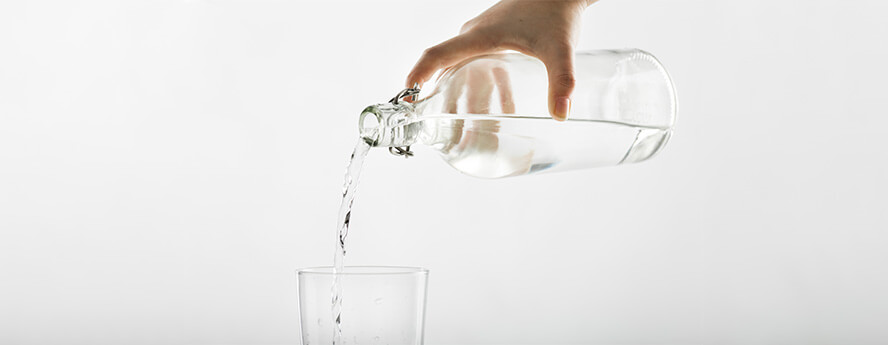
On average, our bodies will always contain a water content of above 50%, so no wonder we are always told to stay hydrated in order to keep healthy. We can consume the amount of fluid required by our bodies from various sources such as food and drinks, yet one of the healthiest and cheapest ways to hydrate is by drinking water.
Water is one of the essential nutrients our body needs and drinking water is important because we need to replace what we lose through sweat, urination and even breathing. Although this cycle is part of our everyday lives, how often do you think about the water you drink?
In this article we are going to look at the two main types of drinking water – natural mineral water and tap water - and their effects on your health.
Is all water the same?
Whether it is from the tap or bottled, water provides us with the minerals that our body needs. Minerals are crucial for human health, but they are naturally occurring, meaning our bodies can’t produce them, so we need to get them from our diet.
Some of the minerals that are found in water include:
- Calcium – crucial for bone development, muscle contraction, heart health and blood clotting
- Magnesium – essential for bone formation and heart health
- Sodium – fundamental for fluid balance but high sodium levels in our bodies are associated with high blood pressure
- Chloride - is essential to maintain the balance of body fluids
- Sulfate - Aids in the detoxification of the body
- Fluoride – prevents tooth decay and helps bone development
The amounts of these minerals found in different sources of drinking water vary and it is important to be aware of this when choosing your drinking water.
Tap water - is tap water safe to drink?
British tap water is not only safe to drink, but it’s one of the most regulated drinks out there, placing it among the best tap waters in the world. It’s also the cheapest, with UKCISA (UK Council for International Student Affairs) estimating that you can hydrate all year for less than £1. For the water to reach your tap from the treatment plant, it takes between a few hours and a few days, so tap water it’s also fresh. However, hot tap water used for consumption may not always be fresh, as this may come from a storage tank in your home.
Some people have a misconception that tap water is not good for drinking because it may have a different taste, smell or appearance. This may be due to factors like the level of chlorine in water, how the water is treated, seasonal effects and plumbing, but the nutritional value of the water shouldn’t generally be affected.
Filtered water - should I filter my tap water before drinking?
Filtering tap water reduces its hardness, impurities, and chlorine levels, thus making its taste more appealing. However, filtered water does not offer any more nutritional value than tap water.
Natural mineral water – better than tap water?
Unlike tap water, which can come from both groundwater and surface water sources (rivers and reservoirs), natural mineral water is collected only from protected, natural, underground sources and bottled at source. This means the water keeps its original purity and mineral content without being treated (only limited treatments are allowed).
Each natural mineral water has its unique mineral composition, depending on the rocks the water seeps through, which explains why you can find so many varieties of mineral water in shops.
Some people may prefer to drink it for a specific mineral intake or just for its taste, but there is no conclusive evidence that natural mineral water is healthier than other types of water. However, if your water supply is not guaranteed to be safe, then bottled water is recommended instead.
We should remember though that, because most mineral water comes bottled in plastic bottles, it may contain microplastics which can be harmful especially if they accumulate in different body organs over time.
Hard or soft water?
Water hardness refers to the level of dissolved minerals (mainly magnesium and calcium) per million particles of water, so hard water is richer in minerals than soft water. Typically, natural mineral water is hard water and many parts of the UK have a hard tap water supply. Even though you may notice limescale left by your water in kettles or glasses, hard water from your tap is still good for drinking.
Does pH matter?
Water can also have different acidity levels (measured by the pH level) and it is usually categorised under acidic water (pH<7) or alkaline water (pH>7). A pH of 7 is considered neutral, which is around the pH that your blood has (7.4). Although small differences in the pH of water do not have a direct effect on your health, pH control is important in the water treatment process as too acidic or too alkaline water can throw off your normal pH, making you sick.
The bottom line
Bottled natural mineral water is a good choice for drinking and may provide more minerals in comparison with tap water. You might also prefer bottled water for its taste and smell. However, a cheaper and equally healthy source of water in the UK is tap water, which is completely safe to drink and provides good mineral content.
Whatever your preference, the important thing is to keep drinking. While the exact mineral composition depends on where the water comes from and whether and how it was treated, any water that is safe for drinking is a good option to keep hydrated.
Disclaimer: The content of this website is provided for informational purposes only and does not substitute the advice of a professional.